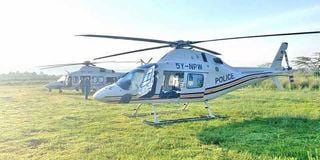Police want KDF out of its air wing operations

Kenya Police Air Wing helicopters during a Safari Rally event in Naivasha last year. The National Police Service is now demanding back control of its air wing from the military two years after it was placed under the National Air Support Department.
The National Police Service (NPS) is now demanding back control of its air wing from the military two years after it was placed under the National Air Support Department (NASD).
NPS also want back control of the Marine Police Unit, while the Forensic Laboratory should be left exclusively under the control of the Directorate of Criminal Investigations (DCI).
The request was made by the Inspector-General of Police to the task force on police and prison reforms.
The NPS lost control of its air wing two years ago through an Executive Order of the National Security Council that placed it under NASD, a department within the Ministry of Defence.
The department was mandated to manage the operations and maintenance of all aviation air assets owned by all government ministries, departments and agencies, including the Kenya Wildlife Service, the Kenya Electricity Transmission Company Limited, the Kenya Forest Service, the Kenya Pipeline Company Limited, the Ministry of Health and the Department of Resource Surveys and Remote Sensing.
The move was aimed at ensuring that all government agencies using aeroplanes work under one control for easier coordination, especially during emergencies.
It was also aimed at ensuring high technical maintenance standards and increasing aircraft serviceability by bringing back to flying status planes that had been grounded for years.
In August last year, NASD revealed that it had successfully repaired two Cessna 208 fixed-wing planes and four AB206s helicopters belonging to NPS.
However, on Monday, the task force that is chaired by former Chief Justice David Maraga was informed that, before air wing operations were transferred, NPS had 13 planes which were serviceable but had remained with only one that is operational. Twelve are grounded with no plan to repair them.
The Inspector-General, backed by senior officers, put up a spirited fight to convince the task force to allow the police to gain full control of the Police Air Wing, arguing that the NPS has not received proper services as anticipated.
The argument was yesterday supported by National Police Service Commission (NPSC) chairman Eliud Kinuthia.
Though the police vented all the frustrations they encountered with the Air Support Unit, the task force team took the NPS team to task to explain circumstances leading to the previous government’s decision to order the police to surrender management of the air wing to the multi-agency team.
Deputy Inspector-General of Police Edward Mbugua and the commandant of the Police Air Wing were at pains to explain what informed the decision to surrender the key department to the military.
Detailed complaint
In 2019, a senior police officer formerly attached to the air wing teamed up with junior officers and wrote a detailed complaint to the Inspector-General, accusing the then commandant of corruption, mismanagement, nepotism, fuel theft, abuse of office and misuse of police pilots.
The allegations damaged the reputation of the department, forcing then Inspector-General of Police Hillary Mutyambai to sanction an inquiry.
The findings of the inquiry were, however, never made public but were partly suspected to have formed the basis of the reorganization of the unit.
The task force said it would look into the issue and whether the situation was putting the careers of the 58 pilots and 24 engineers deployed to the air wing at risk.
On Tuesday, the prisons service also said it lacks its own planes for emergency operations despite having qualified personnel, some of whom are seconded to the Police Air Wing.
It wants the government to increase its funding to establish its own air wing. The NPS also called on the task force to recommend that the Marine Police Unit, which was reportedly placed under the Kenya Coast Guard Service, be reverted back to it.
A senior officer at Vigilance House explained that all assets plus over 50 personnel were transferred to the entity but the police are yet to benefit as was intended. Further, the task force was told that police officers seconded to Kenya Coast Guard Service are poorly paid compared to officers from other agencies.
Another bone of contentious was on the DCI Forensic Laboratory which the police want to remain under their exclusive control.
The NPS proposed that the NPS Act be amended so that the lab is domiciled in the DCI. The DCI assembled detectives from anti-terrorism and homicide units to explain the importance of the lab and why it should remain under the control of the DCI.
The task force team challenged the DCI to give proper justification why the laboratory should not be placed under an independent body to manage it since other civilian investigative agencies within the criminal justice system will also use it.
The laboratory played a crucial role in processing and gathering evidence which was used to prefer criminal charges against high-profile individuals such as the Deputy President, a Court of Appeal judge and senior government officials.
Ironically, DCI officers are on record disowning the evidence presented in court, leading to the collapse of some of the cases. Some human rights agencies have argued that, if the lab is left under the exclusive control of the NPS without proper oversight, it could be used to sabotage justice.
NPSC also proposed to have a rotational IG to ensure that all formations get a chance at leading the service.





